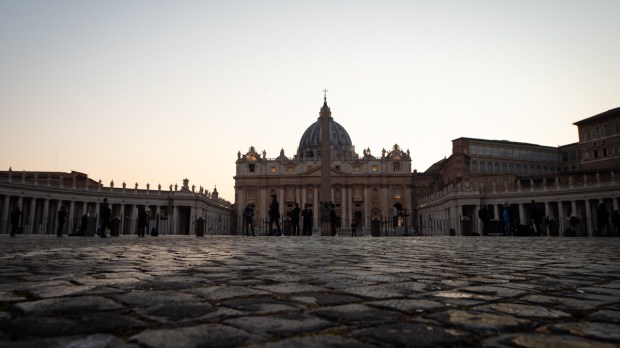Pope Francis prayed at morning Mass on April 21 that all of us might grow in our capacity to listen.
In this time, there is so much silence. You can even hear the silence. May this silence, which is a bit new to our habits, teach us to listen, to increase in us the capacity to listen. Let us pray for this.
The Holy Father focused his homily on the first Christian community, as a model for us, noting how the Holy Spirit is the great Creator of harmony.
To be born from above is to be born with the strength of the Holy Spirit. We can’t take the Holy Spirit for ourselves, we can only allow Him to transform us. And our docility opens the door to the Holy Spirit: it is He who makes the change, the transformation, the being born from above. It is Jesus’ promise to send the Holy Spirit. The Holy Spirit is capable of working marvels, things that we can’t even think.One example is this first Christian community, which is not a fantasy – that’s what they tell us here. It’s a model; it’s where one can arrive when there is docility, and the Holy Spirit is allowed to come in and to transform us. An “ideal” community, let us call it.It’s true that immediately following this, the problems start, but the Lord shows us how far we can get if we are open to the Holy Spirit, if we are docile. In this community, there is harmony. The Holy Spirit is the master of harmony. He is able to create it and he has done so here. He has to create harmony in our hearts; he has to change many things in us, but he has to create harmony: He is harmony itself. Also the harmony between the Father and the Son: He is love in harmony. Him. And he, with harmony, creates these things with this harmonious community. This is the model: The Lord has permitted that this model of an almost “celestial” community shows us up to what point we should reach.But then the divisions in the community start. The Apostle James says in the second chapter of his Letter: ‘May your faith be immune to favoritism.’ Because there was favoritism! ‘Do not show partiality’: The Apostles have to go and reprimand. And Paul, in the First Letter to the Corinthians, in chapter 11, complains: “I’ve heard that there are divisions among you.” Internal divisions in the communities arise. The “ideal” should be reached, but it isn’t easy.There are many things that divide a community, whether a parish community or a diocesan or priestly community, or of men or women religious … many things come in to divide a community.Looking at the things that divided the first Christian communities, I find three:
First, money. When the Apostle James says this, that there shouldn’t be favoritism, he gives an example: ‘If in your church, in your assembly, a man with a gold ring comes in, you immediately place him at the front, and the poor one stays to the side.’ Money. Paul says the same: ‘The rich bring food and eat, and the poor, on foot.’ We leave them there as if to say to them: ‘Do what you can.’ Money divides. Love for money divides a community, divides the Church.Many times in the history of the Church, where there have been doctrinal deviations — not always, but many times nevertheless – there’s money behind it. The money of power, both political power, and money itself, but it’s money. Money divides a community. That’s why poverty is the mother of a community, poverty is a wall that protects a community. Money divides. Self-interest. Even in families. How many families end up divided over an inheritance? How many families? And they don’t speak to each other any more … how many families … an inheritance. They divide. Money divides.Another thing that divides a community is vanity. This desire to feel that you’re better than the others. “Thank you Lord, that I am not like the others,” the prayer of the Pharisee. Vanity. To feel that I’m … And vanity also in showing off, vanity in our actions, in our dress … How many times – not always, but yes, so many times – the celebration of a sacrament is an example of vanity: Who shows up with the best clothes, who does this, who does that … Vanity. The biggest party. Vanity gets in there, too. And vanity divides. Because vanity leads you to be a peacock and where there is a peacock, there is always division.A third thing that divides a community is speaking badly: It’s not the first time I say this, but it’s the reality. It’s the reality. This thing that the devil puts in us, like a necessity to speak of others: “What a good person he is …” “Yes, yes, but, but …” Immediately, the “but,” … It’s a rock to discredit the other one … and immediately something that I heard said … and thus I diminish the other one a bit.But the Spirit always comes with his strength to save us from the worldliness of money, of vanity, and of speaking badly, because the Spirit is not of this world. He is against this world. He can make these miracles, these great things.Let us ask the Lord for this docility to the Spirit, so that he transforms us and transforms our communities, our parish, diocesan, religious communities: That he transform them, so that we can always go forward in the harmony that Jesus wants for the Christian community.

